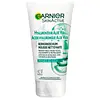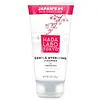What's inside
What's inside
 Key Ingredients
Key Ingredients

 Benefits
Benefits

 Concerns
Concerns

 Ingredients Side-by-side
Ingredients Side-by-side

Water
Skin ConditioningSorbitol
HumectantLauric Acid
CleansingStearic Acid
CleansingMyristic Acid
CleansingPotassium Hydroxide
BufferingGlycol Distearate
EmollientPalmitic Acid
EmollientKaolin
AbrasiveSodium Cocoamphoacetate
CleansingCoco-Betaine
CleansingParfum
MaskingAloe Barbadensis Leaf Juice Powder
Skin ConditioningSodium Chloride
MaskingSodium Hyaluronate
HumectantAscorbyl Glucoside
AntioxidantDisodium EDTA
Hydroxypropyl Methylcellulose
Emulsion StabilisingPolyquaternium-7
Sodium Benzoate
MaskingPhenoxyethanol
PreservativeWater, Sorbitol, Lauric Acid, Stearic Acid, Myristic Acid, Potassium Hydroxide, Glycol Distearate, Palmitic Acid, Kaolin, Sodium Cocoamphoacetate, Coco-Betaine, Parfum, Aloe Barbadensis Leaf Juice Powder, Sodium Chloride, Sodium Hyaluronate, Ascorbyl Glucoside, Disodium EDTA, Hydroxypropyl Methylcellulose, Polyquaternium-7, Sodium Benzoate, Phenoxyethanol
Sodium Cocoyl Glycinate
CleansingGlycerin
HumectantCocamidopropyl Betaine
CleansingButylene Glycol
HumectantPotassium Cocoyl Glycinate
Hydroxypropyl Starch Phosphate
Decyl Glucoside
CleansingPEG-400
Emulsion StabilisingWater
Skin ConditioningSodium Lauroyl Aspartate
CleansingBHT
AntioxidantCitric Acid
BufferingDisodium EDTA
Glyceryl Stearate Se
EmulsifyingHydroxypropyl Methylcellulose
Emulsion StabilisingHydroxypropyltrimonium Hyaluronate
Lauric Acid
CleansingMethylisothiazolinone
PreservativeMica
Cosmetic ColorantPEG-32
HumectantPhenoxyethanol
PreservativePolyquaternium-7
Polyquaternium-52
Sodium Acetylated Hyaluronate
HumectantSodium Stearoyl Glutamate
CleansingStearic Acid
CleansingTitanium Dioxide
Cosmetic ColorantSodium Cocoyl Glycinate, Glycerin, Cocamidopropyl Betaine, Butylene Glycol, Potassium Cocoyl Glycinate, Hydroxypropyl Starch Phosphate, Decyl Glucoside, PEG-400, Water, Sodium Lauroyl Aspartate, BHT, Citric Acid, Disodium EDTA, Glyceryl Stearate Se, Hydroxypropyl Methylcellulose, Hydroxypropyltrimonium Hyaluronate, Lauric Acid, Methylisothiazolinone, Mica, PEG-32, Phenoxyethanol, Polyquaternium-7, Polyquaternium-52, Sodium Acetylated Hyaluronate, Sodium Stearoyl Glutamate, Stearic Acid, Titanium Dioxide
Ingredients Explained
These ingredients are found in both products.
Ingredients higher up in an ingredient list are typically present in a larger amount.
Disodium EDTA plays a role in making products more stable by aiding other preservatives.
It is a chelating agent, meaning it neutralizes metal ions that may be found in a product.
Disodium EDTA is a salt of edetic acid and is found to be safe in cosmetic ingredients.
Learn more about Disodium EDTAThis ingredient is a semi-synthetic polymer created from cellulose. In case you need a refresher, cellulose is the main component of plant cell walls.
Hydroxypropyl Methylcellulose has many uses:
- emulsifier
- create a gel-like texture
- boost foam
Lauric Acid is a fatty acid or lipid. About half of fatty acids in coconut oil is lauric acid.
This ingredient helps hydrate and sooth skin. As a humectant, it helps trap moisture. It also aids in cleaning and enhancing the texture of products.
Lauric acid may not be Malassezia folliculitis, or fungal acne, safe.
Learn more about Lauric AcidPhenoxyethanol is a preservative that has germicide, antimicrobial, and aromatic properties. Studies show that phenoxyethanol can prevent microbial growth. By itself, it has a scent that is similar to that of a rose.
It's often used in formulations along with Caprylyl Glycol to preserve the shelf life of products.
Polyquaternium-7 is a light to clear colored liquid. It is commonly found in haircare products for its film-forming and anti-static properties.
According to a manufacturer, it is a non-paraben and specially developed for negatively charged surfactant systems. This makes it a great hairstyle holder and helps to improve wet hair detangling without adding buildup.
Stearic Acid is a fatty acid. It is an emollient, emulsifier, and texture enhancer.
As an emollient, stearic acid helps soften skin. It aids the skin's protective barrier by preventing water loss. It also provides a gentle cleansing effect without stripping away natural oils.
Stearic acid may also be used to enhance the texture of products. It can add volume and stabilize ingredients such as water and oil. This can help water and oil ingredients from separating.
Sources of stearic acid include animal or vegetable fats/oils such as coconut or shea. It can be naturally found in butter, cocoa butter, shea butter, vegetable fats, and animal tallow.
This ingredient may not be Malassezia folliculitis, or fungal-acne safe.
Learn more about Stearic AcidWater. It's the most common cosmetic ingredient of all. You'll usually see it at the top of ingredient lists, meaning that it makes up the largest part of the product.
So why is it so popular? Water most often acts as a solvent - this means that it helps dissolve other ingredients into the formulation.
You'll also recognize water as that liquid we all need to stay alive. If you see this, drink a glass of water. Stay hydrated!
Learn more about Water